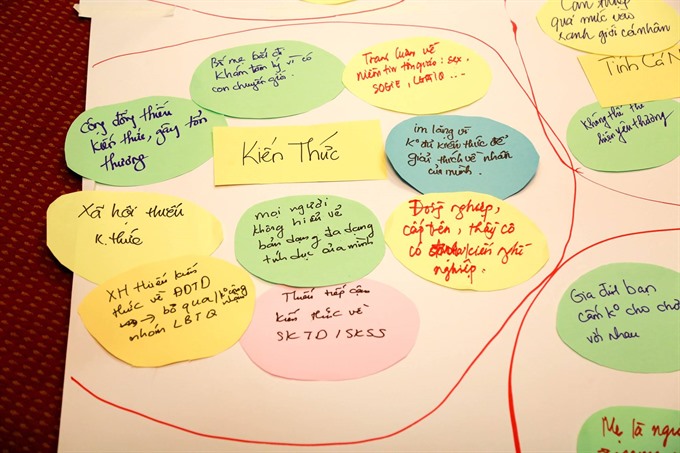 Society
Society

Dozens of lesbian, bisexual, transgender and queer women (LBTQ) from 15 cities and provinces across Việt Nam gathered in Hà Nội in the last two days for a workshop.
 |
| Lesbian, bisexual, transgender and queer women (LBTQ) participating to "No longer Silenced" workshop speak about their difficulties they face. — Photo Courtesy UN Women |
HÀ NỘI — Dozens of lesbian, bisexual, transgender and queer women (LBTQ) from 15 cities and provinces across Việt Nam gathered in Hà Nội in the last two days for a workshop.
They talked about the hardships they faced as they were “not normal” according to socially accepted norms.
The gathering was the first national LBTQ community consultation workshop in Việt Nam co-organised by UN Women, Women Make A Difference --- an initiative promoting gender equality and empowering women, and Feminest --- a network of civil societies for women rights in Việt Nam.
Titled “No Longer Silenced,” the workshop saw the participation of government agencies, civil societies and media and aimed to provide a platform to LBTQ women to speak about their experience and the difficulties faced by them and give recommendations so that they could be part of inclusive development activities and programmes.
LBTQ is a vulnerable and disadvantaged group in Việt Nam because of strong public discrimination.
Nguyễn Hải Yến, one of the speakers at the workshop, said the LBTQ movement in Asia had been growing stronger, with the Asian Lesbian Network being established in 1986 and its first international conference taking place in 1990, but LBTQ in Việt Nam had less visibility as a community.
There were few research and data about LBTQ people and even if available, they were mostly inaccessible, Yến said.
“LBTQ people face gender stereotypes and sexism within the larger LGBTIQ (lesbian, gay, bisexual, transgender, intersex and queer) community, institutions and society. They are not included in programmes on women’s rights, gender equality, sexual health, reproductive healthcare or community empowerment,” she said.
A participant from HCM City said many LBTQ women were afraid of coming out or joining surveys of development projects that benefited them.
They lived “in silence” because they thought they would not be safe if people, including their families, knew about their “true gender”.
After the discussion, participants agreed that in Việt Nam, LBTQ women had many disadvantages.
They were still not confident about themselves before their families, friends and society. They faced mental harassment and discrimination at home, school and work that prevented them from coming out.
They lacked an understanding of gender, gender equality and women rights.
In Việt Nam, there were few tailored healthcare programmes for LBTQ women, especially those relating to sexual and reproductive health.
With such problems, LBTQ women present at the workshop called for proper action and programmes by relevant agencies to ensure that “no one is left behind” for inclusive development.
The workshop was aimed at providing an opportunity to LBTQ women to stand together and step by step build a stronger LBTQ community in Việt Nam. — VNS




